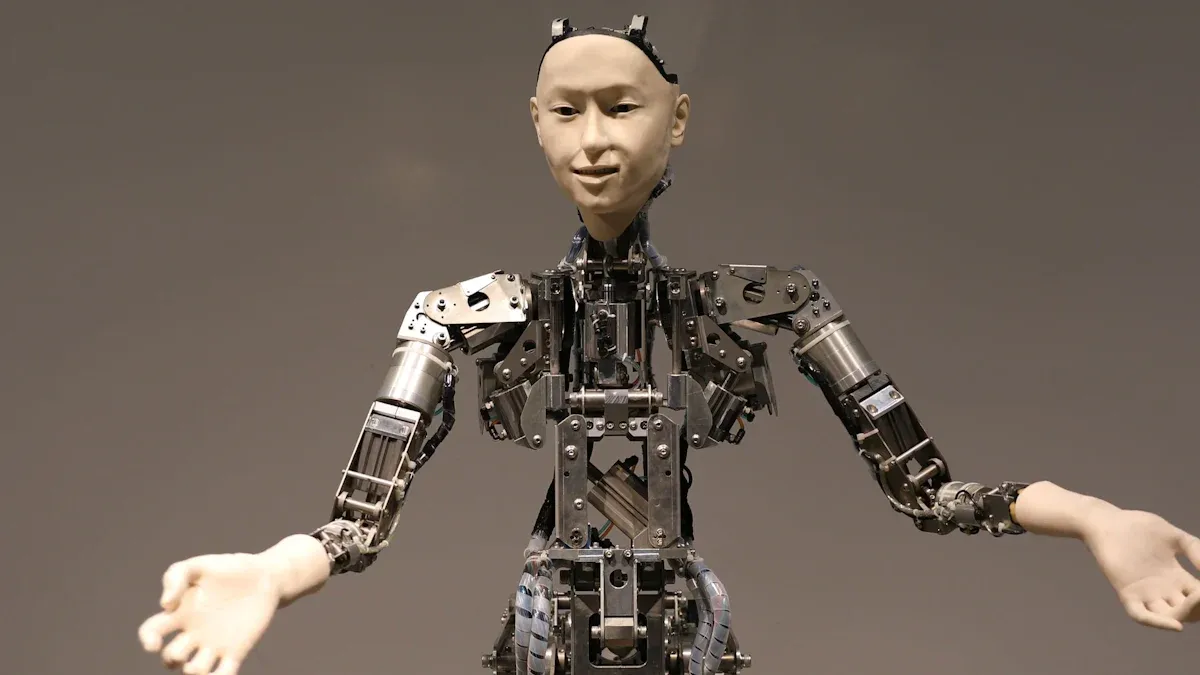Are Free AI Story Generators the Future of Book Writing?

Imagine having a tool that helps you craft stories faster, sparks your creativity, and even breaks down the barriers to writing. Free AI story generators are doing just that. They’re changing how you approach storytelling by offering instant ideas and structured storylines. Platforms like Mugafi have become trusted companions for writers, helping you overcome challenges like writer’s block or plot development. These tools don’t just save time—they make creative writing more accessible to everyone. Whether you’re a seasoned author or just starting out, they’re opening doors to endless possibilities.
Key Takeaways
Free AI story tools help everyone write by giving quick ideas.
These tools save time by making drafts fast for writers to edit.
AI helps with writer's block by giving prompts and new ideas.
AI is fast but often misses feelings and unique storytelling.
Writers should think about ethics like ownership and copying when using AI.
AI can match a writer's style and suggest fitting ideas.
Mixing human creativity with AI makes writing faster and more creative.
AI helps with ideas, but real stories come from the writer's life.
The Benefits of Free AI Story Generators

Accessibility for Aspiring Writers
Lowering barriers to entry for new authors.
Have you ever dreamed of writing a book but felt overwhelmed by where to start? Free AI story generators make it easier than ever to dive into storytelling. These tools provide a starting point for anyone, even if you’ve never written a story before. You don’t need to be a professional writer or have years of experience. With just a few clicks, you can generate ideas, outlines, or even full drafts. It’s like having a writing coach right at your fingertips.
Providing tools for those with limited resources.
Writing can be expensive. Hiring editors, attending workshops, or purchasing software adds up quickly. Free AI story generators level the playing field by offering powerful tools at no cost. Whether you’re a student, a hobbyist, or someone on a tight budget, these platforms give you access to resources that were once out of reach. They help you focus on your creativity without worrying about financial barriers.
Speed and Efficiency in Story Creation
Generating story ideas and drafts quickly.
Time is precious, especially when you’re juggling multiple responsibilities. Free AI story generators can save you hours by instantly providing story ideas or even full drafts. Imagine typing in a simple prompt and receiving a detailed plot outline in seconds. These tools take the guesswork out of brainstorming, so you can spend more time refining your story.
Streamlining the writing process for faster output.
Writing a book is a marathon, not a sprint. But what if you could speed up the process without sacrificing quality? AI tools help you organize your thoughts, structure your chapters, and even suggest improvements. They act as your virtual assistant, handling repetitive tasks so you can focus on the creative aspects of writing. The result? Faster progress and less frustration.
Inspiration and Overcoming Writer’s Block
Offering creative prompts and ideas.
Writer’s block can feel like hitting a brick wall. Free AI story generators are like a sledgehammer, breaking through that wall with fresh ideas. They can provide starting points, create placeholder content, or even emulate specific writing styles to inspire you. For example, platforms like Mugafi generate unique story arcs and character profiles based on your input. This instant access to creative suggestions helps you focus on storytelling instead of staring at a blank page.
Helping writers move past creative roadblocks.
Sometimes, all you need is a little push to get back on track. AI tools can reflect your ideas back to you, sparking new inspiration. You can input fragments of a story, and the AI will expand on them, helping you regain momentum. Whether you’re stuck on a plot twist or struggling with dialogue, these tools make it easier to keep moving forward.
Tip: Think of AI as your brainstorming buddy. It doesn’t replace your creativity—it enhances it.
The Limitations of Free AI Story Generators
Lack of Originality and Emotional Depth
Repetition of common tropes and clichés.
When you rely on free AI story generators, you might notice a pattern. These tools often recycle familiar tropes and clichés. Why? AI depends on data-driven algorithms, which means it pulls from existing stories and trends. While this can help generate quick ideas, it limits creativity.
AI-generated stories often lack originality and uniqueness.
They struggle to create narratives that feel fresh or groundbreaking.
Critics argue that these stories can feel formulaic, making them less convincing than human-written ones.
AI is great at processing data, but it struggles with emotional depth and developing truly new ideas.
Difficulty in creating nuanced, emotionally resonant characters.
Creating characters that feel real and relatable is a challenge for AI. You know how a great story makes you feel connected to its characters? That’s because human writers infuse their work with personal experiences and emotions. AI, on the other hand, lacks this intuitive understanding.
Machines can’t replicate the emotional depth and human experience of writing.
AI-generated characters often fail to capture the nuances of human emotions and relationships.
If machines are just pumping out content based on algorithms, where’s the room for actual innovation and originality?
Ethical Concerns in AI-Generated Content
Questions about authorship and intellectual property.
Who owns the content created by AI? This question has sparked debates among writers and legal experts. If you use an AI tool to write a story, are you the author, or is the AI? The issue becomes even more complicated when AI models are trained on copyrighted materials.
AI models trained on copyrighted works may produce content that infringes on existing intellectual property.
Authors are still accountable for the content they submit, even if AI was involved.
Disclosing your use of AI tools on open platforms could affect your intellectual property rights.
Risks of misuse for plagiarism or low-quality content.
AI tools make it easy to generate content, but this convenience comes with risks. Some users might misuse these tools to plagiarize or flood the market with low-quality stories.
AI-generated responses may include verbatim passages from other sources, leading to unintentional plagiarism.
The ease of creating content could result in a surge of poorly written or unoriginal works.
Dependence on Pre-Existing Data
Reliance on datasets that may lack diversity.
AI story generators rely on pre-existing datasets to create content. If these datasets lack diversity, the stories they produce will reflect the same biases. This can limit the range of perspectives and voices in storytelling.
AI tools often draw from a narrow pool of data, which can exclude underrepresented groups.
Stories generated by AI may unintentionally reinforce stereotypes or overlook unique cultural narratives.
Inability to create truly innovative or groundbreaking stories.
Innovation requires thinking outside the box, something AI struggles with. Since these tools depend on patterns and trends, they’re not equipped to break new ground in storytelling.
AI algorithms produce content that feels the same as everything else.
Machines can’t replicate the creative leaps that come from human imagination.
Free AI story generators are powerful tools, but they’re not without flaws. Understanding these limitations can help you use them more effectively while preserving the heart of storytelling—your unique voice.
Balancing Human Creativity and AI Assistance
The Complementary Role of AI
Enhancing, not replacing, human creativity.
AI tools are like having a creative partner who never runs out of ideas. They don’t replace your imagination but amplify it. For instance, platforms like Sudowrite and Novelcrafter can help you brainstorm plot twists, develop characters, or even outline entire stories. Whether you’re stuck on a scene or need fresh inspiration, these tools step in to keep your creativity flowing.
AI can generate new plot ideas and suggest character arcs, making the writing process smoother.
Tools like ChatGPT allow you to request specific creative support, enhancing collaboration.
AI story generators can create diverse content, from short stories to poetry, giving you a wide range of options.
By handling repetitive tasks, AI lets you focus on what truly matters—crafting a compelling narrative. Imagine spending less time worrying about grammar or structure and more time diving into the heart of your story. That’s the magic of combining human creativity with AI assistance.
Allowing writers to focus on storytelling while AI handles repetitive tasks.
Writing a book involves more than just creativity. There’s research, editing, and organizing ideas—all of which can feel overwhelming. AI tools simplify these tasks, acting as your virtual assistant. They help you streamline the process so you can concentrate on storytelling.
Take a look at how this balance works in practice:
Project | Benefits of AI Assistance | Human Creativity Role |
|---|---|---|
Golf Cart Project | Enhanced functionality and sustainability through AI suggestions. | Critical evaluation of AI contributions ensured decisions were grounded in human judgment. |
Concept Car Project | Integration of advanced features while maintaining brand identity. | Control over the design process allowed for imaginative and feasible designs. |
General Findings | 72.8% of students agreed AI tools improved product research, sparking new concepts. | AI served as a resource for inspiration, complementing human ideas and expertise. |
This synergy between you and AI ensures that your creative vision remains at the forefront while the technology takes care of the heavy lifting.
Preserving the Human Touch in Storytelling
Ensuring emotional depth and authenticity in narratives.
No matter how advanced AI becomes, it can’t replicate the emotional depth that comes from human experiences. Stories resonate because they reflect real emotions, struggles, and triumphs. Readers connect with characters who feel authentic, and that’s something only you can provide.
Research shows that emotional authenticity makes stories more believable and memorable. It’s what keeps readers turning pages and coming back for more. By weaving your personal experiences into your writing, you create narratives that AI simply can’t match.
Highlighting the irreplaceable value of human experiences and perspectives.
Your unique perspective is your superpower. AI might suggest ideas, but it’s your voice that brings them to life. Think about the stories that have moved you the most—they likely came from someone’s lived experience.
When you combine your insights with the efficiency of AI, you get the best of both worlds. AI can help you brainstorm or refine ideas, but the heart of the story will always come from you. This balance ensures that storytelling remains a deeply human art, even in an AI-driven future.
Note: Free AI Story Generators are tools, not replacements. They’re here to assist, not overshadow, your creative genius.
The Future of Free AI Story Generators in Book Writing

Advancements in AI Technology
Improved algorithms for more creative and original outputs.
AI technology is evolving at an incredible pace, and you’re likely to see even more creative possibilities in the near future. Developers are working on algorithms that can better understand context, tone, and style. This means AI could soon generate stories that feel more unique and less repetitive. While current tools sometimes struggle with originality, future advancements aim to address this by refining how AI processes and combines data.
AI is already helping less creative writers produce engaging content.
However, concerns about homogenization in AI-generated stories highlight the need for innovation.
As these tools improve, they’ll become better at mimicking human creativity, offering you outputs that are not only faster but also more imaginative.
Potential for AI to adapt to individual writing styles.
Imagine an AI tool that learns your voice over time. This isn’t just a dream—it’s a real possibility. Future AI story generators could adapt to your unique style, making their suggestions feel more personal and aligned with your vision.
Enhanced personalization will allow AI to match your tone and preferences.
Tools may even integrate multimedia elements like images or soundtracks to enrich your storytelling.
These advancements could transform how you approach writing, making the process feel more collaborative and tailored to your needs.
Challenges and Opportunities Ahead
Addressing ethical and legal concerns in AI-generated content.
With great power comes great responsibility, and AI in writing is no exception. You might wonder, who owns the content created by AI? This question has sparked debates about authorship and intellectual property. Writers also worry about the artistic integrity of using AI, fearing it might devalue human creativity.
Public distrust of AI-assisted works reflects concerns about its impact on the writing profession.
The 2023 Writers Guild of America strike highlighted the challenges writers face in protecting their work from AI misuse.
Despite these concerns, AI also opens doors for innovation. By automating repetitive tasks, it allows you to focus on higher-value creative work, like crafting compelling narratives.
Balancing innovation with the preservation of traditional storytelling values.
AI offers exciting possibilities, but it’s essential to preserve the heart of storytelling—human emotion and ingenuity. While AI can assist with structure and ideas, it’s your unique perspective that makes a story truly memorable.
Writers must balance the efficiency of AI with the authenticity of traditional storytelling.
Human empathy and critical thinking remain irreplaceable in crafting narratives that resonate.
By embracing AI as a tool rather than a replacement, you can ensure that storytelling remains a deeply human art.
The Role of Writers in an AI-Driven Future
Adapting to new tools while maintaining creative control.
As AI becomes more integrated into writing, you’ll need to adapt without losing your creative voice. Many writers are already finding ways to use AI effectively, setting boundaries to preserve their love for the craft.
Writers develop workflows that involve multiple iterations and decision points, ensuring they stay in control.
AI proves helpful in various stages of writing, from planning to reviewing.
By approaching AI with intention, you can use it to enhance your creativity while staying true to your vision.
Embracing AI as a partner in the creative process.
Think of AI as your creative partner, not your competitor. These tools can inspire you, help you overcome writer’s block, and even suggest fresh plotlines. They’re not here to replace you—they’re here to make your job easier.
AI story generators provide endless inspiration, helping you explore new ideas.
Writing communities are finding ways to integrate AI while maintaining their traditions.
By viewing AI as a collaborator, you can unlock new possibilities in storytelling while keeping the human touch at the forefront.
Free AI story generators are changing how you approach writing. They make storytelling faster, easier, and more accessible. However, they come with challenges like a lack of emotional depth and over-reliance. Here's a quick look at their strengths and weaknesses:
Pros | Cons |
|---|---|
Idea Generation | Lack of Emotional Depth |
Consistency Checks | Over-reliance |
Language Enhancement | Authenticity Issues |
The future of book writing lies in blending human creativity with AI assistance. You bring originality and emotional depth, while AI enhances efficiency and quality. Take a look at how this balance works:
Design Phase | Role of AI | Human Creativity | Benefits |
|---|---|---|---|
Pre-AI | Foundation for creativity | Develops original concepts | Ensures creative ownership |
Post-AI | Augmentation of ideas | Enhances design process | Improves efficiency and quality |
AI isn’t here to replace you. It’s a tool that complements your creativity, helping you focus on what matters most—telling stories that resonate.
FAQ
1. Are free AI story generators easy to use?
Yes, they’re super user-friendly! Most platforms let you input a simple prompt, and the AI does the rest. You don’t need technical skills or prior experience to get started.
2. Can AI story generators help me finish a book faster?
Absolutely! AI tools streamline the writing process by generating ideas, outlines, and drafts quickly. They handle repetitive tasks, so you can focus on storytelling and finish your book faster.
3. Will using AI make my story less original?
Not necessarily. AI provides ideas and suggestions, but you control the final product. By adding your unique voice and perspective, you ensure your story stays original and authentic.
4. Do I need to credit the AI tool in my book?
It depends. Some platforms recommend disclosing AI assistance, especially for transparency. However, you remain the author since you guide the creative process and make final decisions.
5. Can AI help me overcome writer’s block?
Definitely! AI story generators offer prompts, plot ideas, and character suggestions to spark your creativity. They’re like having a brainstorming buddy who never runs out of ideas.
6. Are there any risks in using AI for writing?
Yes, there are a few. AI might produce repetitive content or rely on biased datasets. You should also watch out for ethical concerns like plagiarism or intellectual property issues.
7. Can AI adapt to my writing style?
Some advanced tools can! They learn from your input and adjust their suggestions to match your tone and style. This makes the collaboration feel more personal and tailored.
8. Is AI a replacement for human creativity?
Not at all. AI is a tool, not a substitute. It enhances your creativity by handling tedious tasks and providing inspiration. The heart of storytelling—emotional depth and originality—still comes from you.
Tip: Think of AI as your creative partner. It helps you work smarter, not harder!
See Also
A Comprehensive Guide to Writing Blog Posts Using AI
Becoming Proficient in Writing for Rygar Enterprises
Step-by-Step Instructions for Writing a Free Blog

